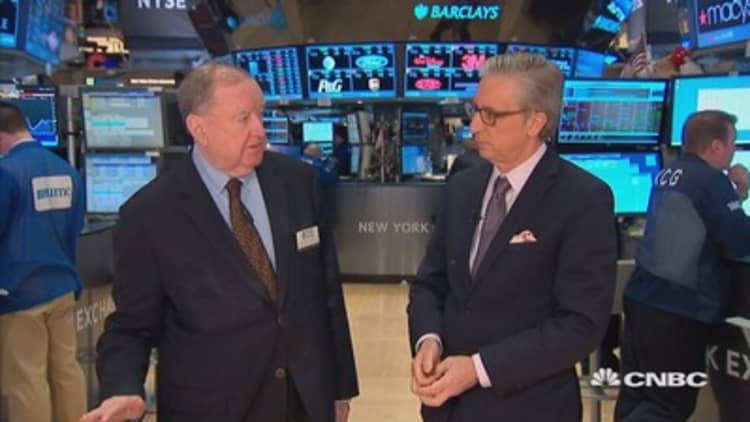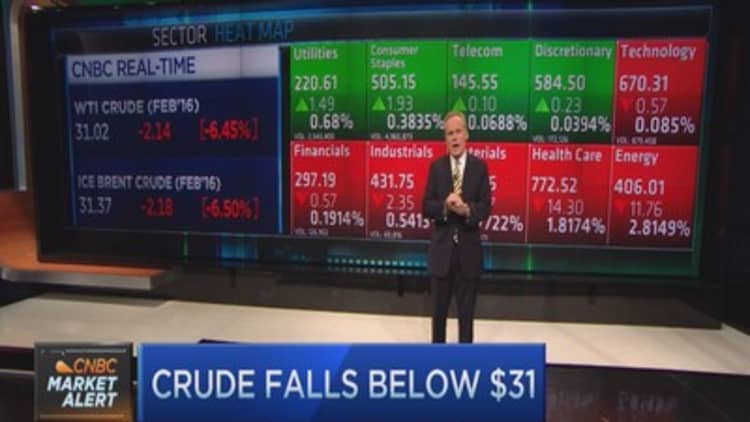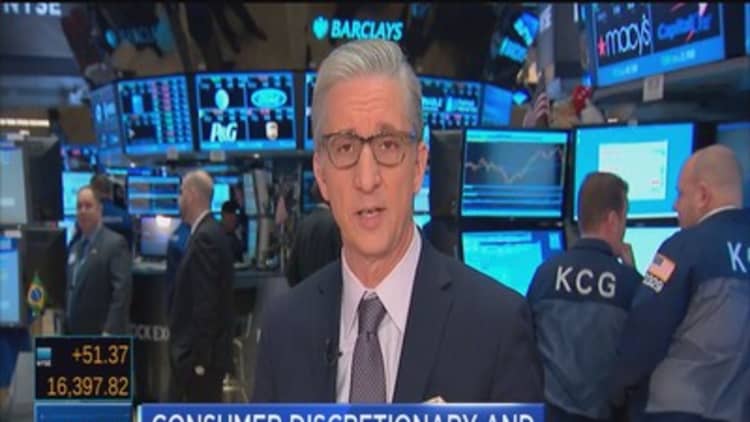


U.S stocks closed mixed Monday, stabilizing after their worst week since 2011, as declines in commodity prices weighed. (Tweet This)
The Nasdaq composite closed mildly lower for its eighth-straight day of losses.
The Dow Jones industrial average closed about 50 points higher after fluctuating between gains and losses of more than 100 points in each direction. The S&P 500 also held higher in the close.
"People were hoping the market would show some signs of finding a bottom. (There's an) underlying trend of people trying to get a little bit early into a bottom here," said Robert Pavlik, chief market strategist at Boston Private Wealth.
If the "S&P were down another 35 points from where it was right now, people would feel more comfortable (to come in and buy)," he said.
The Nasdaq composite underperformed, closing 0.12 percent lower after falling 1 percent in afternoon trade, as some major tech stocks struggled to hold higher and the iShares Nasdaq Biotechnology ETF (IBB) declined. The ETF closed down about 3.5 percent, more than 25 percent from its 52-week intraday high.
Mike Bailey, director of research and chair at FBB Capital Partners, attributed some of the declines in biotech stocks to "merger arbitrage" after news earlier that Shire will acquire drug maker Baxalta for $32 billion in cash and stock. He also noted possibility of some investor disappointment amid the JPMorgan Health Care Conference.
Read MoreJPMorgan's big health-care confab: What to expect
Apple closed up 1.62 percent after news the firm's Apple Music service surpassed 10 million subscribers. Separately, Mizuho upgraded the stock to "buy" from "neutral."
Health care, materials and energy fell more than 1 percent each as the only decliners in the S&P 500.
Energy closed nearly 2.1 percent lower as the greatest laggard. U.S. crude settled down $1.75, or 5.28 percent, at $31.41 a barrel, after earlier breaking below $31 to hit a 12-year low. Brent also fell below $32 a barrel to hold near 12-year lows.
"Oil is breaking down to new lows again, so that's causing new concerns here again. ... It all stems from China concerns, global growth concerns," said Peter Boockvar, chief market analyst at The Lindsey Group.
Materials closed down almost 1.6 percent as Freeport-McMoRan lost 20.3 percent. Copper traded more than 2 percent lower to fall below $1.97 and hit its lowest since April 2009.
The sharp decline in Freeport came amid news Arch Coal filed for Chapter 11 bankruptcy protection, as part of a restructuring agreement reached with lenders who hold more than $4.5 billion of the coal mining company's debt.
"Bankruptcies, closing of capacity, this is what happens when you reach extreme bottoms. I think we're close to a bottom," Boockvar said, noting he is not sure when or where that bottom actually is.
One-day performance in 15-minute intervals
The Russell 2000, which contains many energy and biotech names, closed mildly lower to hold within 20 percent of its 52-week high. In intraday trade, the small-cap index briefly fell more than 20 percent from its 52-week intraday high, in bear market territory.
The Dow Jones industrial average and Nasdaq composite remained more than 10 percent below their 52-week intraday highs, in correction territory. The S&P 500 held within 10 percent of its 52-week high.
"I still think ultimately you need to be a seller on the rallies," said John Caruso, senior market strategist at RJO Futures. He cited "uncertainties around the world" and expectations of a "weak corporate earnings cycle."
Alcoa was scheduled to report earnings after the bell, ahead of major financial firms' results due later in the week.
Read MoreThese stocks do best in rocky markets
The Dow transports closed down half a percent, well off session lows.
"Overall, given the fact that oil is at (multi-year) lows, our markets have held up fairly well," said Randy Frederick, managing director of trading and derivatives at Charles Schwab.
Declines in commodities pressured European stocks to turn lower and remain more than 15 percent below their 52-week intraday highs, in correction territory. The German DAX held more than 20 percent below its 52-week high, in bear market territory.
Helping stocks stabilize overnight was news the People's Bank of China raised the midpoint fix for the yuan against the U.S. dollar to 6.5626. Weakness in the yuan and concerns about further devaluation weighed heavily on global equities last week.
"The communication of the Chinese peg is probably as (important) piece of data that we get. We've had two upticks in the peg even though it didn't help Chinese (stocks)," said Art Hogan, chief market strategist at Wunderlich Securities.
The Shanghai composite lost more than 5 percent Monday, while the Hang Seng closed more than 2.5 percent lower.
Read MoreWhat's next for stocks after trillion-dollar wipeout
U.S. stocks closed sharply lower Friday, ending the first trading week of the year with losses of nearly 6 percent or more, their worst week since 2011. The Dow and S&P 500 had their worst start to a year in history.
"I think in the near-term it was overdone. It's not going to be a one-way trade. The conditions that undermined equity prices last week haven't gone away," said Mark Luschini, chief investment strategist at Janney Montgomery Scott.
Treasury yields held steady, with the near 0.94 percent and the 10-year yield around 2.17 percent.
The U.S. dollar held about 0.3 percent higher against major world currencies, with the euro below $1.09 and the yen at 117.75 yen against the greenback.
In economic news, Atlanta Fed President Dennis Lockhart said in a Reuters report there may not be enough fresh data on inflation to support another U.S. interest rate hike by March, but the economy should grow enough to support more hikes over the rest of the year.
He also said that a slowdown in China and plunging oil prices are now the main risks for what is an otherwise promising outlook for the U.S. economy.
Major U.S. Indexes
Read MoreEarly movers: BXLT, AEO, IHS, HSY, APOL, WSM, YHOO, WFC, AAPL & more
The Dow Jones industrial average closed up 52.12 points, or 0.32 percent, at 16,398.57, with Cisco leading advancers and DuPont the greatest laggard.
The closed up 1.64 points, or 0.09 percent, at 1,923.67, with consumer staples leading seven sectors higher and energy the greatest laggard.
The Nasdaq composite closed down 5.64 points, or 0.12 percent, at 4,637.99.
The CBOE Volatility Index (VIX), widely considered the best gauge of fear in the market, held lower near 24.
About two stocks declined for every advancer on the New York Stock Exchange, with an exchange volume of nearly 1.1 billion and a composite volume of about 4.6 billion in the close.
Gold futures for February delivery settled down $1.70 at $1,096.20 an ounce.
—CNBC's Peter Schacknow and Reuters contributed to this report.
On tap this week:
Monday
Earnings: Alcoa
7:50 p.m.: Dallas Fed President Robert Kaplan
Tuesday
Earnings: CSX, Progress Software
5:30 a.m.: Fed Vice Chairman Stanley Fischer on policy and rates
6 a.m.: NFIB small business optimism index
10 a.m.: JOLTS
1 p.m.: Three-year note auction
3:15 p.m.: Richmond Fed President Jeffrey Lacker
Wednesday
Earnings: Infosys, Supervalu
7:45 a.m.: Boston Fed President Eric Rosengren
10 a.m.: Atlanta Fed business inflation expectations
10:30 a.m.: Oil inventories
12:30 p.m.: Chicago Fed President Charles Evans
1 p.m.: 10-year note auction
2 p.m.: Federal budget, Beige book
Thursday
Earnings: JPMorgan Chase, Intel, First Republic Bank, Shaw Comm.
8:15 a.m.: St. Louis Fed President James Bullard
8:30 a.m.: Initial claims, import prices
10:30 a.m.: Natural gas inventories
1 p.m.: 30-year bond auction
Friday
Earnings: BlackRock, Citigroup, US Bancorp, Wells Fargo, PNC Financial Services, Fastenal
8:30 a.m.: Retail sales, PPI, Empire state manufacturing survey
9 a.m.: New York Fed President William Dudley
9:15 a.m.: Industrial production
10 a.m.: Consumer sentiment, business inventories
1 p.m.: Dallas Fed President Robert Kaplan
1 p.m.: Oil rig count
*Planner subject to change.
More From CNBC.com:






